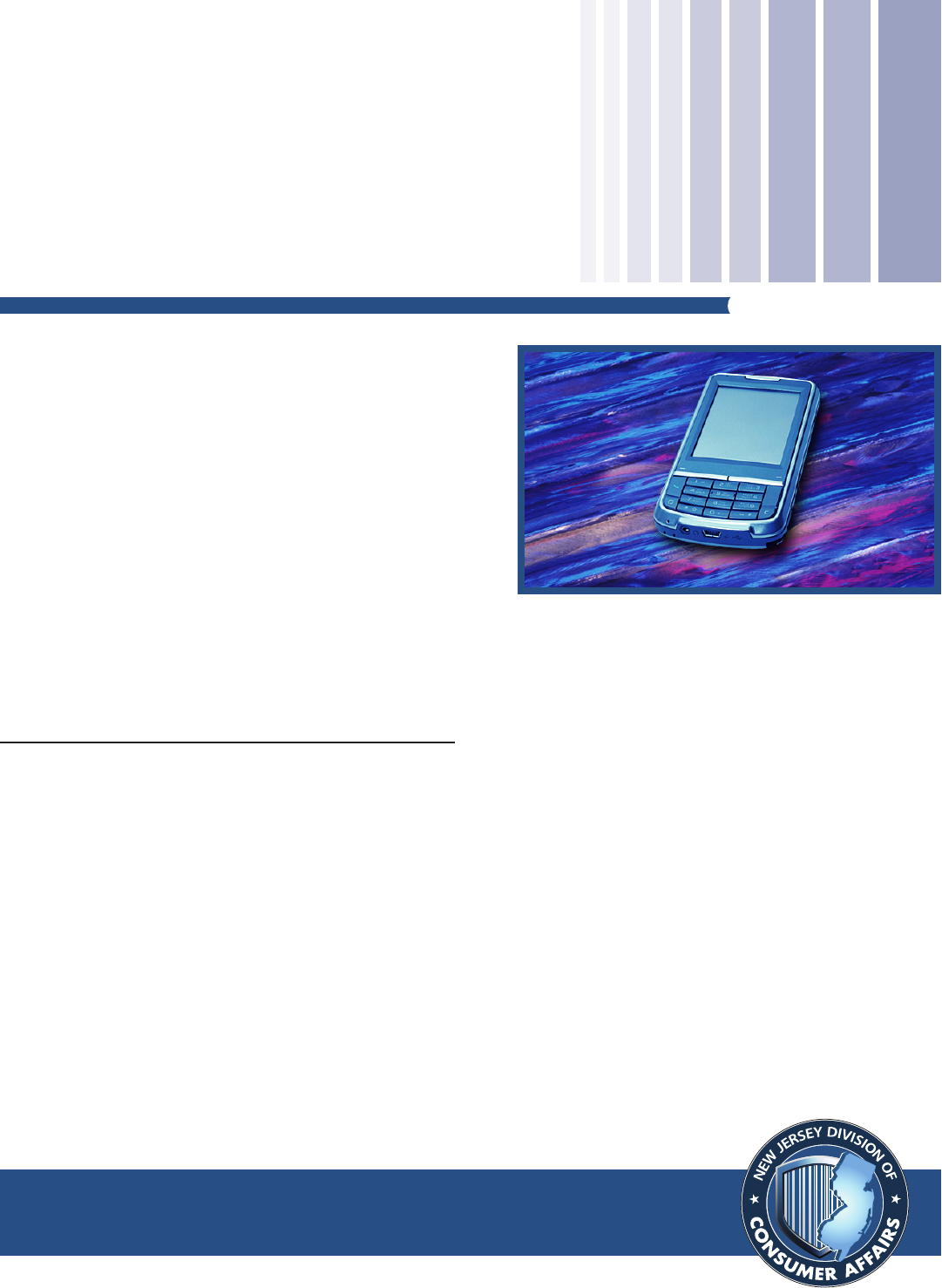
consumerbrief
800-242-5846
New Jersey Division of Consumer Affairs
www.NJConsumerAffairs.gov
A Consumer Guide to
Cellular Phones
Whether you call them cell phones or mobile devices, it
seems like everyone has one. A mobile phone is a device that
can make and receive telephone calls over a radio link while
moving around a wide geographic area. In addition to
being used as telephones, modern mobile devices also
support a wide variety of other services such as text
messaging, Multimedia Messaging Service (MMS), e-mail,
Internet access, short-range wireless communications
(infrared and Bluetooth), business applications, gaming
and photography. Mobile phones that offer these and
more general computing capabilities are referred to as
smartphones.
Mobile phone services are unregulated but, as stated, they
are very popular with consumers. Many consumers use
their cell phones as their home phones. Before you buy a
cell phone plan, consider the following:
CONSUMER TIPS
■ Shop around to find a plan that best fits your
needs.
■ Find out about the monthly access fee and the
charge for air time during peak calling hours.
■ Ask about charges for dialing “800” numbers and
directory assistance. Generally, they are charged as
calls made outside your “home calling area” and
may result in additional expenses.
■ Check on “per-call” surcharges and whether you
will be charged if you reach a busy signal or if your
party does not answer, and if there are costs for
incoming calls.
■ Inquire about all fees associated with a service
plan. Some plans contain charges for “air time,
roaming, and universal funds.” There are also taxes
associated with wireless service.
a-consumer-guide-to-celluar-phones • Revised 06/07/23
■ Check the contract for an automatic renewal
provision. Ask if there are any cancellation fees.
Some long-term contracts may offer lower rates,
but will lock you into a plan that may not be
suitable for you in the future. The contract you are
signing is binding so the phone service contract is
yours for the duration of the contract.
■ Inquire about “dead zones.” All services have gaps
in their coverage areas.
■ Read the contract carefully and make sure that
you understand all of the terms before signing it.
Get everything in writing.
■ Remember to review your bill every month for
mistakes and to see if new programs have been
added without your knowledge.
■ Do not forget to check once in a while how many
minutes of your approved time you have used.
Extra minutes over your approved time can be
very costly.
Continued

800-242-5846
New Jersey Division of Consumer Affairs
www.NJConsumerAffairs.gov
■ If you do not want to receive telemarketer calls on
your cell phone, call the National Do Not Call
Registry at 888-382-1222 from the cell phone
you wish to register. Registration is free.
TALKING AND TEXTING WHILE DRIVING
Texting or talking while driving is a distracted, dangerous
activity that diverts a person’s attention away from the
primary task of driving. According to the National
Highway Traffic Safety Administration, in 2010 alone,
over 3,000 people were killed in distracted driving crashes.
Almost every state in the nation has some type of restriction
about using a mobile device while driving. Visit www.
ghsa.org/html/stateinfo/laws/cellphone_laws.html.
New Jersey has one of the toughest laws in the nation
about the use of cell phones while driving:
■ Drivers must use hands-free devices while talking
on cell phones ($100 fine plus costs).
■ Text messaging and the use of video games are
prohibited while driving.
■ School bus operators are prohibited from using
cell phones while driving.
■ Drivers under the age of 21 with learner’s permits
or probationary licenses are prohibited from using
cell phones, texting devices and other hand-held or
hands-free wireless electronic devices while driving
(including iPods).
New Jersey also has adopted a law allowing prosecution
of cell phone users if they drive recklessly and cause
serious harm or death. Penalties could include prison
time and fines up to $150,000, similar to drunken driver
punishments. The legislation, A1074, was tagged as
“Kulesh, Kubert and Bolis’ Law,” after New Jersey victims
of distracted driving accidents. Hand-held cell phone users
causing serious crashes while driving would be prosecuted
under criminal homicide or assault-by-vehicle laws. Visit
Handsfreeinfo.com or www.distraction.gov for more
information about distracted driving, or write to or call:
National Highway Traffic Safety Administration
200 New Jersey Avenue SE
Washington DC 20590
1-888-327-4236 | 1-800-424-9153
CELL PHONES AND RADIATION SCAMS
The increase in cell phone use has generated concern
about possible health risks related to radio-frequency
electromagnetic fields from this technology, and a market
for shields as possible protection against the radio waves
the phones emit. There is no scientific proof that these
shields significantly reduce the exposure. In fact, these
shields may interfere with the phone’s signal, causing it
to draw even more power to communicate with the base
station and possibly emit more radiation. The Federal
Trade Commission (www.ftc.gov) has some practical
tips to help you avoid scams and limit your exposure to
electromagnetic emissions from your cell phone:
■ Increase the distance between you and your phone
by using an earpiece or the speakerphone feature.
■ Consider texting more and limiting your cell
phone use to short conversations.
■ Wait for a good signal. A weak signal makes your
phone work harder and emit more radiation.
■ A phone’s specific absorption rate (SAR) reveals the
maximum amount of radiation the human body
absorbs from the phone while it’s transmitting.
SAR testing ensures that the devices sold in the
U.S. comply with the Federal Communications
Commission’s SAR exposure limit. For more
information about SAR you can view “SAR For
Cell Phones: What It Means For You.” by visiting
www.fcc.gov.
■ For information on cell phone and health
issues, go to the National Cancer Institute’s (www.
cancer.gov) fact sheet about cancer risk and cell
phones.
Division of Consumer Affairs
973-504-6200 • 800-242-5846
(toll free within New Jersey)
www.NJConsumerAffairs.gov
